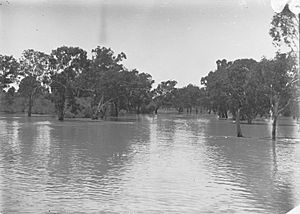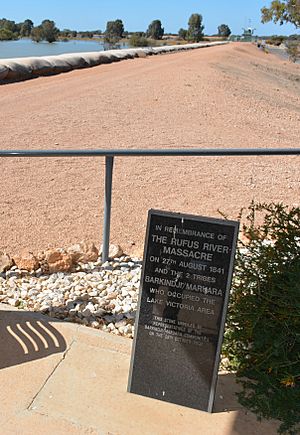Rufus River massacre facts for kids
The Rufus River Massacre was a sad and violent event that happened in 1841. It took place along the Rufus River in Australia. During this time, many Aboriginal people were killed by European colonists. This event was part of the Australian frontier wars, a period when Europeans were settling in Australia.
Quick facts for kids Rufus River massacre |
|
|---|---|
| Part of the Australian frontier wars | |

A photograph of the Rufus River
|
|
| Location | Rufus River, New South Wales |
| Coordinates | 34°03′S 141°15′E / 34.050°S 141.250°E |
| Date | 1841 August 27 |
|
Attack type
|
Massacre |
| Deaths | 30+ killed |
| Victims | Aboriginal Australians |
| Assailants | European colonists led by Matthew Moorhouse |
Contents
About the Rufus River
The Rufus River is a short river in New South Wales, Australia. It connects Lake Victoria with the Murray River. This area is very close to the borders of Victoria and South Australia.
The local Maraura people lived here for a very long time. They likely first met Europeans in 1830. This was when explorer Charles Sturt traveled down the river.
Early European Travelers
After Sturt, more Europeans started to arrive. In 1838, "overlanders" Joseph Hawdon and Charles Bonney drove cattle from Sydney to Adelaide. They followed the Murray River. This path became a busy "stock route." A stock route is a path used to move farm animals.
By April 1841, many European groups had used this route. About 480 people, 90,000 sheep, and 15,000 cattle traveled through Aboriginal lands. These routes often followed old Aboriginal pathways. As more Europeans arrived, disagreements and conflicts began to happen.
Growing Conflicts
On April 16, 1841, a group of 11 overlanders was attacked. They were led by Henry Inman and had 5,000 sheep. The attack happened near Lake Bonney. Two people from the European group were killed.
A group of volunteers went to get the sheep back. They were also attacked on May 7.
Official Response
The Governor of South Australia, George Grey, decided to act. He appointed special police officers. These officers worked under Major Thomas O’Halloran. Matthew Moorhouse, who was the Protector of Aborigines, also joined them. A Protector of Aborigines was an official who was supposed to protect the rights and welfare of Aboriginal people.
A large group of police left Adelaide on May 31. They met another group of overlanders on June 22. This group, led by Alfred Langhorne, had been attacked two days earlier. In that attack, four Europeans and five Aboriginal people were killed. Many others were injured.
The Massacre
Another official group, including police and Matthew Moorhouse, went to the Murray River in July 1841. In August, they met a group of overlanders led by William Robinson. This group had also been attacked earlier. In that conflict, five Aboriginal men were killed and ten were hurt. No Europeans were injured.
Moorhouse and two others then met a large group of local Aboriginal men and women. This was near Lake Victoria. A clash happened, even though Moorhouse tried to talk to them.
What Happened
According to Moorhouse's report, about 30 Aboriginal people were killed. Around 10 were wounded. Four Aboriginal people were captured. Many of the wounded would likely not survive their injuries. Only one European person was wounded.
Later, an investigation looked into the event. It included talking to an Aboriginal interpreter and one of the captured people. The investigation decided that the actions of the Europeans were justified. It said that some of the trouble started because of disagreements over resources and interactions. This led to more conflicts, including Aboriginal groups taking thousands of European sheep. Moorhouse said that about 150 Aboriginal people seemed ready to attack. He claimed the massacre was done to stop such an attack.
Different Accounts
Robinson, one of the overlanders, disagreed with Moorhouse's report. He said that "thirty to forty were killed, and as many wounded."
James Collins Hawker wrote about the event in his book in 1899. He said: "The firing lasted about fifteen minutes, 30 natives were killed, 10 wounded and 4 taken prisoner... This was the Protector's report but in after years when I was residing on the Murray and had learnt the language of the natives, I ascertained that a much larger number had been killed..." This shows that the true number of people killed might have been even higher.
See also
- Australian frontier wars
- List of massacres of Indigenous Australians
- Maria (brigantine)
 | Precious Adams |
 | Lauren Anderson |
 | Janet Collins |


